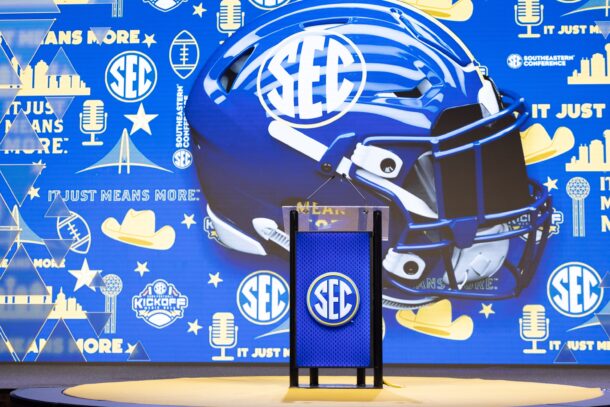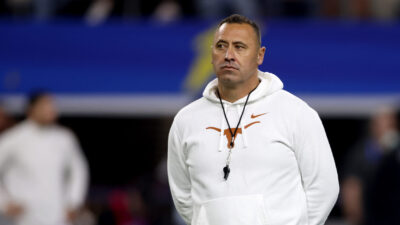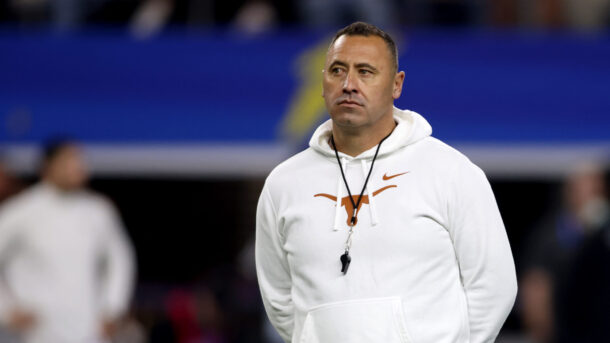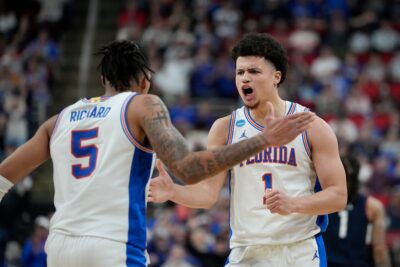Ad Disclosure

Column: Derrick Henry not a slam dunk, but a deserving Heisman Trophy winner
By John Crist
Published:
Once Alabama’s Derrick Henry outdueled LSU’s Leonard Fournette on Nov. 7, rushing for more than seven times the yardage in the Crimson Tide’s 30-16 victory over the Tigers, the Heisman Trophy was his to lose.
As expected, Henry won the Heisman on Saturday to become the second ‘Bama ball carrier — Mark Ingram in 2009 — to take home the most prestigious award in college football. The 6-foot-3, 242-pounder finished ahead of two other finalists who made convincing cases this season, do-everything Stanford running back Christian McCaffrey and silky-smooth Clemson quarterback Deshaun Watson.
Single-season rush yds, SEC all-time:
1. Derrick Henry: 1,986
2. Herschel Walker: 1,891
3. Darren McFadden: 1,830 pic.twitter.com/Hf6fhDiTN1— ESPN (@espn) December 6, 2015
The aforementioned Fournette, who was the proverbial frontrunner before his disappointing performance in Tuscaloosa, wasn’t even invited to New York for the ceremony.
The workhorse of a Tide program ranked No. 2 in the country and on its way to the College Football Playoff again, Henry set an SEC record with 1,986 yards rushing. His 339 rushing attempts are second most in conference history — Herschel Walker of Georgia had a crazy 385 in 1981 — and his 23 rushing touchdowns are tied for first all time with Auburn’s Tre Mason in 2013 and Florida’s Tim Tebow in 2007.
Derrick Henry has won the 2015 #Heisman Trophy! pic.twitter.com/vPCyjSuOUd
— NCAA Football (@NCAAFootball) December 13, 2015
Different people have different definitions for what makes a player deserving of the award, but the following is taken directly from the Heisman Trust’s mission statement:
“The Heisman Memorial Trophy annually recognizes the outstanding college football player whose performance best exhibits the pursuit of excellence with integrity. Winners epitomize great ability combined with diligence, perseverance, and hard work.”
It’s an ambiguous explanation at best, one that has perplexed players, coaches, fans and even voters like myself for years.
Is it simply the best player in the country? Not really. Paul Hornung won for 2-8 Notre Dame in 1956, but he’s the only one to do so on a club with a losing record. Surely there have been other times when “the outstanding college football player” was stuck on a bad team. But voters like winners. Quarterbacks in particular are penalized greatly for losses.
So are we looking for the best player on the best team? Sometimes. Miami was the best team in 1992. Gino Torretta won that year. Was he the best player? Or was he just throwing to Kevin Williams, Lamar Thomas and Horace Copeland? They were future second-, third- and fourth-round NFL draft choices, respectively. Torretta went in Round 7.
Regardless of how you interpret what the Heisman Trust means by “diligence, perserverance, and hard work,” on the gridiron, Henry is a meritorious selection.
The product of Yulee (Fla.) High School won the running back version of the triple crown in 2015, leading the nation in rushing attempts, rushing yards and rushing touchdowns. He topped 200 yards on the ground four times in six weeks — all of which came against SEC West competition — and then gained 189 more in the conference title game vs. SEC East champion Florida.
Few runners in the history of the sport have proven to be more durable, as he was handed 20-plus carries nine times, 30-plus four times and 40-plus twice — on back-to-back weeks, no less. Henry’s nose for the end zone was undeniable, scoring at least one touchdown in all 13 games and hitting paydirt multiple times in five straight contests down the stretch.
That’s not to say Henry was the only logical choice out there, as McCaffrey and Watson put together tremendous campaigns worthy of the bronze.
McCaffrey was an Energizer bunny in shoulder pads for the Cardinal, breaking the FBS record for all-purpose yards previously held by Oklahoma State’s Barry Sanders by recording 1,847 rushing, 540 receiving and 1,109 more on returns.
Watson was a precise passer for the undefeated Tigers based on his 69.5-percent completion rate and 30-to-11 touchdown-to-interception ratio, plus he added 887 yards and 11 extra TDs when he decided to tuck it and run.
And there were other qualified candidates who didn’t even make it to the Big Apple.
Oklahoma quarterback Baker Mayfield had a TD-to-INT ratio (35-to-5) superior to Watson. Florida State running back Dalvin Cook had a yards-per-carry average (7.9) a full two yards better than Henry and McCaffrey. Navy quarterback Keenan Reynolds is FBS’s all-time king with 85 career rushing touchdowns.
While Henry may not have been a no-brainer pick, like Oregon quarterback Marcus Mariota was a year ago, this was simply one of those seasons when a handful of players were almost equally sensational and nobody truly separated himself from the pack.
That’s not to take anything away from the junior, who carried the Crimson Tide’s offense to a 12-1 record, an SEC championship and a shot at a national title. Alabama’s Jake Coker is by far the least impressive quarterback making an appearance in the Final Four — Watson was a Heisman finalist, Mayfield could have been and Michigan State’s Connor Cook is a future first rounder — which underlines how much weight has been put on Henry’s shoulders.
He got my vote. My ballot had Henry first, McCaffrey second and Cook third. It just felt like the year of the running back to me, so I voted accordingly.
ICYMI: @AlabamaFTBL's Derrick Henry won THREE national awards last night.
WATCH » https://t.co/mdxe42CHdS— Southeastern Conference (@SEC) December 11, 2015
It was a clean sweep Thursday for Henry at the College Football Awards show, as he won the Doak Walker Award for the nation’s best running back, the Maxwell Award for the country’s best overall player and the Walter Camp Player of the Year Award. Saturday’s victory at the Marriott Marquis Times Square put a cherry on top of a crimson-and-white sundae.
Henry’s mantel is awfully crowded now that he’s added the Heisman, but Alabama fans are hoping there’s still room left for a national championship trophy.
John Crist is an award-winning contributor to Saturday Down South.




